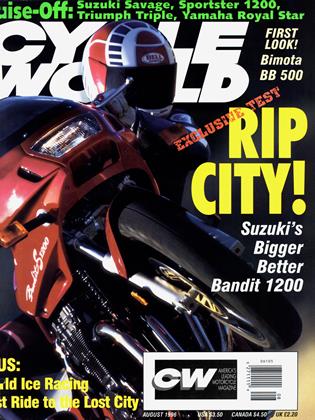MC COLLECTION ANTI-LOCK BRAKE SYSTEM
CW EVALUATION
Bolt-on ABS?
THE ACRONYM “ABS” WHEN APPLIED to brakes means but one thing to most motorcyclists: an expensive active-control system that keeps wheels turning when brakes are applied, no matter how slippery the surface. But for MC Collection, Inc., the term describes something quite different: a small, gas-pressurized aluminum cylinder to be plumbed into the hydraulic lines of a conventional disc-brake system. According to the company, this $175 addition “is a mechanical anti-lock system,” which “shows a high-degree of ability to improve stopping when the brakes are suddenly applied.”
In theory, the device could offer some benefits. Why? Consider a conventional front brake system. A rider squeezes the hand lever, which pushes a smalldiameter piston in the master cylinder. The piston pushes on trapped brake fluid, which in turn pushes equally on everything in the system, including the big pistons down in the caliper. They move out until the pads are solidly against the disc. Then, because the fluid is relatively incompressible, the lever largely stops moving. As the rider squeezes harder, the pressure on the fluid increases, thus increasing the force on the pads. Keep squeezing and eventually the front wheel locks.
MC Collection’s “ABS” passively tries to prevent that locking. Inside its aluminum cylinder is a small chamber that connects to brake-line pressure by a tiny hole. A small metal plate and a rubber grommet are pressed firmly against that hole by nitrogen gas. When a rider first applies the brakes, nothing unusual happens. Eventually, though, he may squeeze hard enough that line pressure equals nitrogen pressure. At that point, the unit acts somewhat like a relief valve, allowing the lever to travel farther without a commensurate increase in line pressure or braking force. Because the chamber is small, the effect is non-linear: That is, line pressure still increases with lever travel, but at a much lesser rate than it would without the system.
Of course, the line pressure that causes wheel lock-up will vary 1 ) with brake-system design and the weight of bike and rider, and 2) with available traction-it takes less brake pressure to lock a wheel on ice than on broomfinished concrete. To deal with the first concern, MC Collection (37 Minoridai, Matsudo-City, Chiba, Japan; 01 1-81-473-64-6555) offers five different units, presumably with varying levels of nitrogen pressure. As for the second concern, the company simply admits that the system can’t prevent locking on a low-friction surface, as can an electronic anti-lock system.
But enough theory, the important question is how the system works in the real world. To find that out, we employed our long-term Triumph Sprint 900. The Sprint wasn’t on the company’s application list, so the distributor recommended the Type 1 unit based on the bike’s weight. The unit mounted easily at the master cylinder using supplied hardware, with installation taking only a few minutes, plus an additional 15 minutes or so to bleed the system afterwards.
Any improvements, however, were subtle. Three of four riders who tried the bike could detect no difference other than a slight increase in the sponginess of the brake lever. What’s more, the front wheel could still be locked from speed on dry asphalt, regardless of whether the brake application was sharp or gradual. In controlled testing, the average of the six best stops from 60 mph was 1 foot better without the system than with it-though a 1-foot difference in a 150-foot stop isn’t particularly significant.
So in this particular application, the “ABS” tag is absolutely unjustified. The Triumph’s brakes certainly behaved nothing like an electronic anti-lock system after the fitment of the MC Collection device, and, in a panic situation, would put a novice on his head just as quickly as in standard form. Nothing in our testing demonstrates anything but the slightest improvement in stopping capability or controllability with the use of the system.
At presstime, Cycle World learned that MC Collection’s U.S. distributor, Westwind Trading Co. (519 Estudillo Ave., Suite B, San Leandro, CA 94577; 510/483-6721), had decided not to import the MC Collection ABS system “due to the high cost of liability insurance.’’ Another distributor is anticipated.
 View Full Issue
View Full Issue









